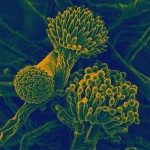Link to Pubmed [PMID] – 24637148
Curr. Opin. Immunol. 2014 Aug;29:1-7
Innate immunity is classically defined as unable to build up immunological memory. Recently however, the assumption of the lack of immunological memory within innate immune responses has been reconsidered. Plants and invertebrates lacking adaptive immune system can be protected against secondary infections. It has been shown that mammals can build cross-protection to secondary infections independently of T-lymphocytes and B-lymphocytes. Moreover, recent studies have demonstrated that innate immune cells such as NK cells and monocytes can display adaptive characteristics, a novel concept for which the term trained immunity has been proposed. Several mechanisms are involved in mediating innate immune memory, among which epigenetic histone modifications and modulation of recognition receptors on the surface of innate immune cells are likely to play a central role.

